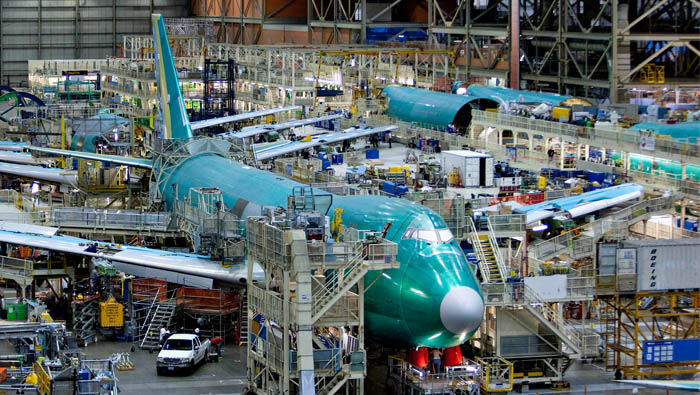
Chicago: Boeing said it expects to report a $2.1 billion after-tax accounting cost for the second quarter as it absorbs expenses from programmsr with well-publicised stumbles: the 787 Dreamliner, the 747-8 jumbo jet and a refueling tanker for the United States Air Force.
The largest blow is related to the Dreamliner, Boeing’s carbon-fibre jet, which debuted more than two years late in 2011, according to a company statement Thursday. The US planemaker is writing off two flight-test aircraft, at a cost of $847 million after determining it can’t find any buyers.
Boeing is also absorbing an after-tax charge of $814 million for the 747-8 as it drops plans to double output to 12 jumbos a year in 2019 from the current six-plane rate. The manufacturer expects to take a $393 million loss for the KC-46 aerial tanker, which was knocked off schedule by wiring bundles, a faulty refueling boom and other issues.
The losses serve as reminders of the costly delays that stalk commercial aerospace companies as they race complicated technology to market. Boeing has vowed to manage its product development better in the aftermath of the Dreamliner delays, which coincided with those for the latest version of its 747 jumbo jetliner.
"These are the right, proactive decisions to strengthen our business going forward,” chief executive officer Dennis Muilenburg said in the statement. Shares fell 0.7 per cent to $132.60 in New York after falling as much as 1.9 per cent following the company’s announcement of the charges.
Non-cash charges
The accounting losses won’t affect the company’s cash and revenue forecast for 2016, the planemaker said. Boeing will update its earnings guidance on July 27, when it reports second-quarter results. On a pretax basis, the commercial airplane division will absorb a $2.78 billion loss while the military aircraft unit sees a $219 million impact on earnings.
The charge is only the second that Boeing has recorded for the 787 programme, which had $28.7 billion in deferred production and inventory costs as of March 31. The planemaker booked a $2.48 billion research-and-development cost for three flight-test planes in 2009, which were later delivered to museums.
Boeing had hoped to find VIP customers for the two Dreamliners, which were also affected by the company’s early struggles with suppliers, design issues and weight. Built in 2008, the jets have amassed 6,700 flight and ground-testing hours but would need to be heavily modified for commercial use. They were reclassified as a research-and-development expense and removed from 787 programme inventory, where they counted toward deferred production costs.
That could prove beneficial as Boeing works to reduce the drag from its marquee jetliner. The planemaker has said it expects the 787 deferred production costs, which measure funds already poured into inventory and labor against increases in production efficiency, to plateau this year and then fall as it builds more higher-margin Dreamliner models.
Freight weakness
The company also lowered the number of 747 freighters it expects to produce by 19 planes to reflect weakness in the air cargo market. Boeing has struggled to find buyers for the iconic hump-backed jet as airlines shift flying and cargo to more-efficient twin-engine models such as the company’s 777 jetliner. The planemaker recorded a $885 million pretax charge in the fourth quarter as it tapped the brakes on production.
Boeing’s tanker-related charge is the fourth in two years as it struggles to develop the first new US tanker since the 1980s. The company said the cost is related to delays announced earlier this year for the first 18 planes it is building for the Pentagon, as well as to a hardware fix for the plane’s refueling boom that was successfully tested earlier this month.
"It puts a damper on the Air Force’s recent announcement that the fix was in place and that the program was back on track to negotiate a production contract,” Jason Gursky, an analyst at Citigroup, said in a note to clients on Thursday.
Bloomberg reported earlier this year that the U.S. Securities and Exchange Commission is investigating whether Boeing properly accounted for the costs and expected sales of the 787 and 747, two of its best-known jetliners.